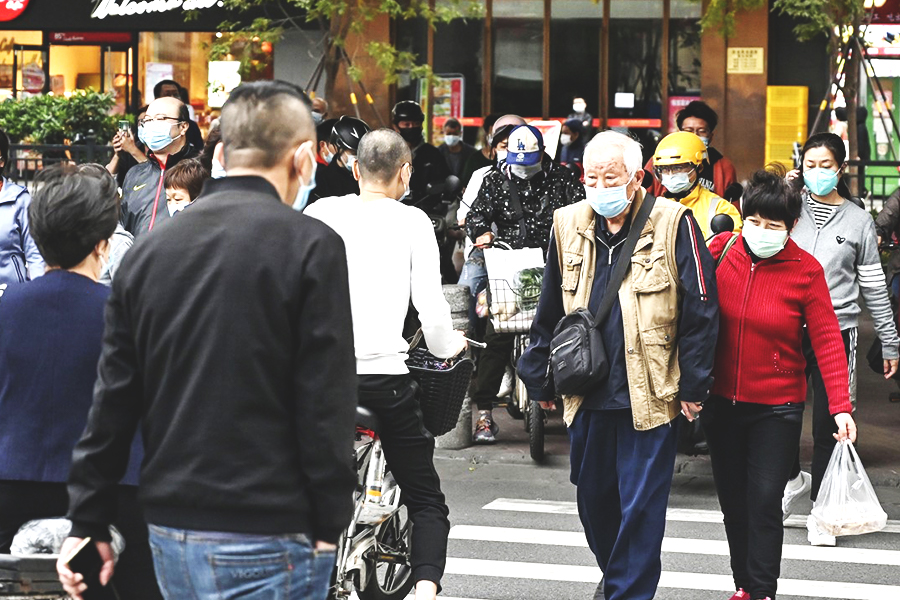
Strengthening the team of officials.
The IPBCN studied and implemented the critical messages of General Secretary Xi Jinping’s speeches at the 21st collective study session of the CPC Central Political Bureau and the opening ceremony of the Party School of CPC Central Committee’s training program for young and middle-aged officials. In particular, in line with the Party’s organizational doctrines in the new era and the general principle of placing officials under the Party’s stewardship, the IPBCN duly enforced the leadership evaluation criteria in the new era to create a team of high-quality regulatory officials who are loyal to the Party, have moral integrity, and demonstrate a keen sense of responsibility.
Prioritizing political loyalty and strict political review, the IPBCN assessed and selected officials based on how they performed on the frontline of controlling Covid-19, promoting the recovery and growth of the real economy, reducing poverty, and advancing comprehensive reforms. In addition, in optimizing the leadership structure at all levels, the IPBCN created a leadership-team building plan and introduced innovative approaches to recommend and elevate outstanding young men and women to deputy-level positions.
In raising officials’ professional, governance, and problem-solving skills, the IPBCN made job rotations a regular program and took full advantage of the supervisory functions of inspections and audits and the training opportunities provided by temporary posts in hardship areas.
In promoting a sense of responsibility, the IPBCN strictly enforced the Regulations on Evaluating the Performance of Party and Government Leaders; enhanced the content and methods of evaluation to ensure that it is result-oriented, rewarded excellent leaders who take responsibility proactively, and penalized those who underperform; and ensured the evaluation results matter to make such evaluations an effective guidance tool.
Strengthening primary-level Party organizations.
To implement General Secretary Xi Jinping’s instructions on Party-building at the primary level, the IPBCN held a system-wide meeting to publicize the United Front Work, issued the key Party-building tasks, enhanced the leadership body of Party-building programs, and leveraged the deliberative and coordination functions of the Party- building leadership group to promote Party-building and strict Party self-governance within the IPBCN system.
Furthermore, by setting up the headquarters as a model for subordinate institutions, the IPBCN helped them build Party branches to the same standards and endowed them with a strong political function, a strong leadership group, a strong team of Party members, and a strong functional role.
In addition, the IPBCN helped the subordinate institutions to duly implement the Regulations on the Activities of Primary-Level Party Organizations and strengthened Party-building activities at industry associations to make those activities more relevant and effective.
The IPBCN also improved the mechanism through which Party conduct and clean governance programs and Party committee secretaries’ Party-building performance are evaluated, in addition to establishing, at regional offices, a point of contact for Party-building programs to enhance oversight and guidance.
Recruitment of Party members, management of the use of Party membership fees, and Party-related statistical works also received due priority, as the IPBCN promptly disbursed those fees as anti-Covid-19 funds to subordinate institutions, following the instruction of the CPC Central Committee, organized Party members to make donations voluntarily, and encouraged primary-level Party organizations and Party members to contribute in their own way to contain the pandemic.
Strictly managing and supervising officials.
In line with the instructions of General Secretary Xi Jinping and the directives of the Fifth Plenary Session of the 19th Central Commission for Discipline Inspection, the IPBCN managed and supervised officials comprehensively and rigorously.
In particular, the IPBCN implemented all the planned tasks for achieving complete and strict Party self-governance, improved supervisory cooperation between the CPC IPBCN Committee and the DDIO, and enhanced oversight of the exercise of powers to ensure the CPC IPBCN Committee fulfills its mandates, and the DDIO fulfills its supervisory responsibilities.
Furthermore, the IPBCN focused its supervisory efforts on the political performance of leaders in key positions, especially the top leaders, reassigned underperforming officials, and exercised strict oversight of the subordinate institutions by extending supervision to one lower level and monitoring to two lower levels.
In addition, the IPBCN held meetings with some of those top leaders to assign and delegate the tasks for strict Party self-governance and official supervision. The IPBCN also conducted adequate day-to-day supervision; offered advice and guidance to officials; strictly enforced the rules regarding holding concurrent positions, making investments, and privately contacting regulated entities; strengthened the management and supervision of departing officials; and using reminders, inquiry letters, and warnings to prevent minor issues from turning into major ones.
Moreover, the IPBCN strengthened the staff’s reporting of personal information to correct a lack of diligence or non-conformant reporting, raise the quality and efficiency of its activities, and avoid promoting problematic officials.
Furthermore, the IPBCN enhanced supervision over the appointment of officials through the “one report and two reviews” system and targeted inspections to improve the selection and appointment of officials throughout the IPBCN system and create a good political environment.